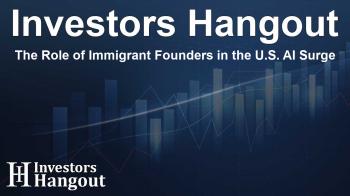The Role of Immigrant Founders in the U.S. AI Surge

Immigrants Driving the U.S. AI Innovation
In recent years, it has become increasingly clear that immigrant founders are a primary force behind the U.S. AI boom. They are not only bringing unique perspectives and innovative ideas but also raising significantly more funding compared to their U.S.-born counterparts. A recent analysis reveals that immigrant-founded AI startups have amassed a whopping $167 billion in funding, which is an impressive 2.5 times more than startups solely established by U.S.-born entrepreneurs.
The Surge of Investment in AI
The excitement surrounding artificial intelligence is palpable as projections indicate a contribution of over $15 trillion to the global economy by 2030. This burgeoning sector has turned the U.S. into a hotspot for technology innovation. Immigrant founders are at the heart of this growth, navigating complex landscapes and leveraging international networks to fuel their ventures.
Key Findings on Immigrant Contributions
According to a thorough examination of the leading privately held AI companies in the United States, a staggering 62% of these businesses have at least one immigrant founder. This group accounts for a striking 71% of the total funding, showcasing their critical role in shaping the industry. In contrast, U.S.-born-only teams have raised a total of $68.1 billion, only representing 29% of the funding pool. Here are a few key statistics related to this analysis:
- 62% of top private U.S. AI companies have at least one non-U.S. born founder.
- Companies with immigrant founders raised a total of $167B, compared to $68.1B by U.S.-born founders.
- Immigrant-founded industry leaders include notable names such as OpenAI, Anthropic, Databricks, xAI, and Waymo.
- Countries with the highest number of non-U.S. founders include India (23), Israel (14), and China (9).
- California remains the epicenter of the AI sector, housing 66% of the major companies, followed by New York and Texas.
- San Francisco itself is home to 26% of the top 100 AI companies.
Challenges Facing Immigrant Entrepreneurs
Despite the remarkable contributions of these immigrant founders, they encounter numerous challenges that threaten the sustainability of their successes. Immigration policy hurdles, including visa quotas and processing delays, are making it increasingly challenging for talented individuals from around the world to establish their roots and build their businesses in the U.S.
The Global Race for Talent
Countries like Canada, the UK, and the UAE have taken notice of this trend and implemented faster visa processes and more favorable immigration policies, potentially undermining the U.S.'s competitive edge in the AI landscape. The implications of these policies could lead to a significant loss of talent if the U.S. does not adapt.
Dmitri Litvinov, CEO & Co-Founder of Dreem, emphasizes that immigrant founders are pivotal to America's AI success. He notes that restrictive immigration policies are inadvertently pushing innovative talent to seek opportunities elsewhere. His advocacy for abolishing unnecessary country caps and streamlining skilled immigration is echoed by many who fear losing ground in this rapidly evolving sector.
The Future of Dreem and Immigration for Tech Talent
Founded by immigrants and seasoned leaders from major tech companies, Dreem has emerged as a significant player in the immigration landscape. The platform combines expert legal guidance with advanced AI tools to facilitate smoother transitions for tech talent seeking to navigate the complexities of U.S. visas. By viewing each visa application as a project, Dreem ensures meticulous organization and management of all aspects of the application process. With over 120 successful cases, they are increasingly recognized by major tech employers.
As we look to the future, it is clear that immigrant founders will continue to play a pivotal role in driving technological advancements in the U.S. AI sector. Their resilience and innovative spirit are vital as the nation strives to maintain its leadership in the global economy.
Frequently Asked Questions
What percentage of AI companies have immigrant founders?
About 62% of the top privately held AI companies in the U.S. have at least one immigrant founder.
How much funding do immigrant-founded AI companies raise?
Immigrant-founded AI companies have raised approximately $167 billion, representing 71% of total funding for AI startups.
What challenges do immigrant founders face?
Immigrant founders often encounter obstacles like visa quotas, processing delays, and restrictive immigration policies that hinder their ability to establish businesses.
Which countries lead in producing immigrant AI founders?
The leading countries of origin for immigrant AI founders include India, Israel, and China.
What is Dreem?
Dreem is an immigration platform dedicated to helping tech founders and talents secure U.S. visas efficiently using expert guidance and advanced technology.
About The Author
Contact Evelyn Baker privately here. Or send an email with ATTN: Evelyn Baker as the subject to contact@investorshangout.com.
About Investors Hangout
Investors Hangout is a leading online stock forum for financial discussion and learning, offering a wide range of free tools and resources. It draws in traders of all levels, who exchange market knowledge, investigate trading tactics, and keep an eye on industry developments in real time. Featuring financial articles, stock message boards, quotes, charts, company profiles, and live news updates. Through cooperative learning and a wealth of informational resources, it helps users from novices creating their first portfolios to experts honing their techniques. Join Investors Hangout today: https://investorshangout.com/
The content of this article is based on factual, publicly available information and does not represent legal, financial, or investment advice. Investors Hangout does not offer financial advice, and the author is not a licensed financial advisor. Consult a qualified advisor before making any financial or investment decisions based on this article. This article should not be considered advice to purchase, sell, or hold any securities or other investments. If any of the material provided here is inaccurate, please contact us for corrections.

